

The perilous journey from Libya to Europe has long been a tragic route for thousands of migrants seeking refuge from war, poverty, and political instability. Despite the dangers, the hope of a better life continues to drive many to make this dangerous trek. A significant factor fueling this migration is the rise of human smugglers who exploit social media platforms to offer their services, painting a misleadingly optimistic picture of what awaits migrants.
In recent years, smugglers have taken to platforms like Facebook and TikTok, transforming these social networks into digital marketplaces for illicit migration services. This report uncovers the sophisticated tactics employed by smugglers online, exposing how they prey on the desperation of migrants, often with devastating results.
Libya’s instability has made it a key launch point for smugglers sending migrants to Europe. Cities like Zuwarah, Zawiya, and Khoms on the coast serve as key departure points for those willing to risk the dangerous Mediterranean crossing. In inland areas like Sebha, Bani Walid, and Kufra, smuggling networks thrive due to the country’s lawlessness, aided by protection deals with local tribes and community support.
The business of human smuggling is highly decentralised but well-coordinated, making it difficult for authorities to dismantle the networks that operate throughout the country. These smugglers use social media platforms to broaden their reach, promoting dangerous journeys as safe and guaranteed, a powerful draw for those with few alternatives.
Smugglers' Digital Tactics
The investigation highlights the sophisticated methods smugglers use to lure migrants. Through a detailed analysis of social media profiles and keyword searches, we identified numerous online accounts offering smuggling services, primarily on Facebook and TikTok.
Human smugglers rely heavily on Facebook’s detailed profile and page creation features, while TikTok’s short video format is used to engage potential clients with visuals of “successful” sea crossings and journeys. By targeting these platforms’ vast user bases, smugglers have found a way to reach their audience easily and efficiently.
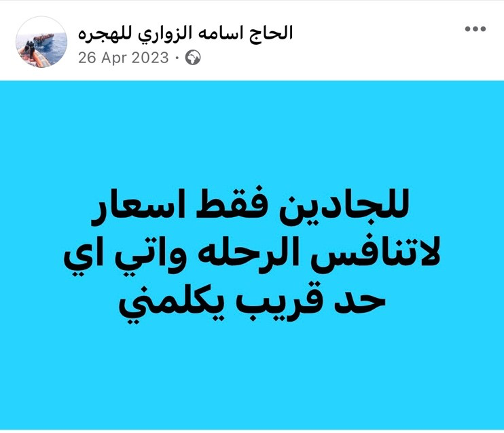
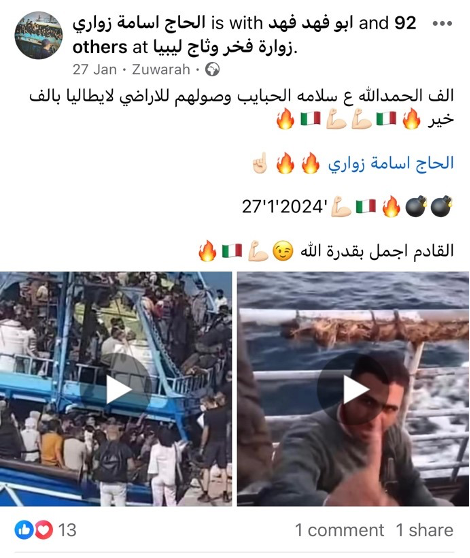
Pic: Platform Usage
Smugglers craft their posts to create a false sense of security, using emotionally charged language that promises a better life in Europe. Posts often depict boats filled with hopeful migrants alongside captions suggesting safety and guaranteed arrival. These visuals—often showing the sea or boats ready to depart—play a powerful role in convincing migrants to take the risk.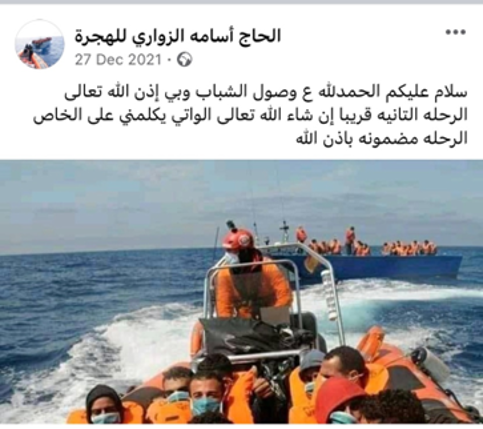
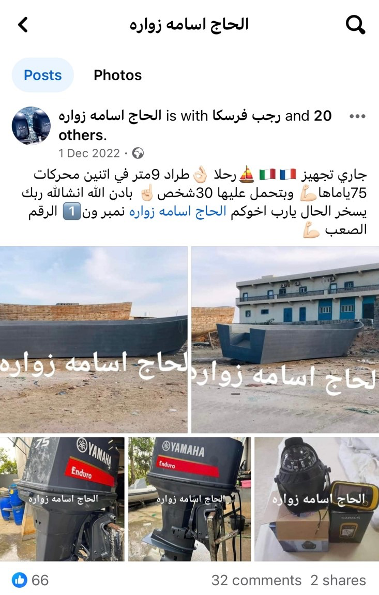
Pic Persuasive Language and Imagery
A particularly disturbing tactic is the use of religious rhetoric. Smugglers often invoke religious language to justify the journey, presenting it as not only permissible but divinely sanctioned. This method manipulates the faith of potential migrants, further complicating their decision-making process.
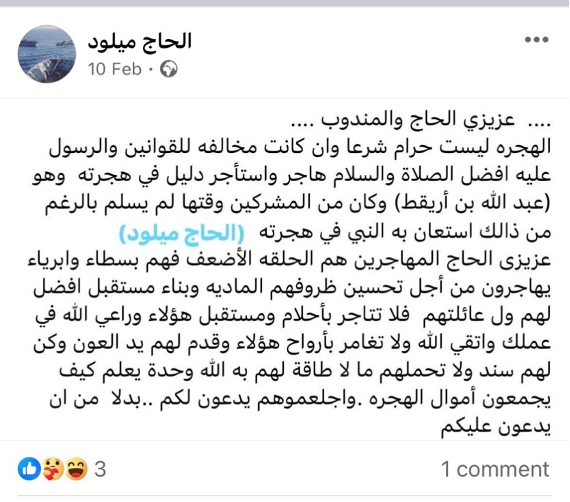
Pic Religious Manipulation
Challenges in Combating Digital Smuggling
Despite efforts by law enforcement and social media companies, human smugglers continue to adapt. Their frequent creation of new profiles and pseudonyms makes it difficult for social media platforms to monitor and remove content promoting illegal migration effectively. Furthermore, the decentralised nature of these networks—combined with Libya’s political instability—adds layers of complexity to the problem.
Efforts to combat this digital smuggling are often hampered by resource limitations, both in terms of technology and personnel. Even strategic migration communication campaigns funded by international organisations have failed to fully address the issue. Many migrants perceive these campaigns as attempts to deter migration rather than as genuine efforts to protect their welfare.
What Can Be Done?
To address the digital dimension of human smuggling, social media platforms must enhance their monitoring systems, employing more sophisticated algorithms to detect smuggling-related content. Governments and international organisations need to strengthen legal frameworks, improve enforcement mechanisms, and provide safe, legal migration alternatives.
Public education campaigns should be tailored to the realities migrants face, using credible voices within communities to communicate the dangers of illegal migration and highlight available legal pathways. Additionally, NGOs play a critical role in tracking and reporting human smuggling activities online, and their collaboration with social media platforms and law enforcement agencies is essential for dismantling these networks.
Conclusion
Human smugglers’ use of social media has added a new dimension to the already complex issue of migration from Libya to Europe. As this investigation reveals, smugglers are exploiting digital platforms to advertise their services and lure desperate individuals into dangerous journeys. While steps have been taken to combat this, much more needs to be done to protect vulnerable migrants.
By investing in better detection tools, improving collaboration between stakeholders, and addressing the root causes of migration, we can disrupt these smuggling networks and offer migrants safer, legal alternatives. The fight against human smuggling is ongoing, but through concerted efforts, we can make meaningful progress in safeguarding lives and dismantling these dangerous digital pathways.
مواضيع أخرى قد تهمك
-
 2021/09/27ألكسا، اغلقي الباب: عصر إنترنت الأشياء ومصير الخصوصيةلا بد أنك سمعت بالهواتف الذكية، لكن هل سمعت عن البيوت الذكية؟ إنها المستقبل الذي يحدث الآن. تطور سكن الإنسان عبر التاريخ، ولا أدرى إذا ما كان بمقدور عقل أسلافنا الذين عاشوا في الكهوف تصور أن الكهف الذي يسكنونه سيصير بعد ملايين السنين بيتاً ذكياً يتحكم فيه ساكنه بلمسة شاشة.
2021/09/27ألكسا، اغلقي الباب: عصر إنترنت الأشياء ومصير الخصوصيةلا بد أنك سمعت بالهواتف الذكية، لكن هل سمعت عن البيوت الذكية؟ إنها المستقبل الذي يحدث الآن. تطور سكن الإنسان عبر التاريخ، ولا أدرى إذا ما كان بمقدور عقل أسلافنا الذين عاشوا في الكهوف تصور أن الكهف الذي يسكنونه سيصير بعد ملايين السنين بيتاً ذكياً يتحكم فيه ساكنه بلمسة شاشة. -
 2020/12/25علاش نصدقوا في الأخبار الزائفة ؟نهارها أنا مكسدة على النت ونقرأ في أخبار ليبيا، خبر يقول زيادة الدرجات، خبر يدوي على العملة، بعدين بوست تحليل لوضع العملة الليبية، وأول ردة فعل ليا كانت إني نصدق، وثاني ردة فعل إني نكذب فخطرلي نسأل روحي علاش؟ ولقيت في دراسة لجامعة دراتموث، وجد الباحثون أن الأخبار الزائفة تنتشر أسرع وأكثر م
2020/12/25علاش نصدقوا في الأخبار الزائفة ؟نهارها أنا مكسدة على النت ونقرأ في أخبار ليبيا، خبر يقول زيادة الدرجات، خبر يدوي على العملة، بعدين بوست تحليل لوضع العملة الليبية، وأول ردة فعل ليا كانت إني نصدق، وثاني ردة فعل إني نكذب فخطرلي نسأل روحي علاش؟ ولقيت في دراسة لجامعة دراتموث، وجد الباحثون أن الأخبار الزائفة تنتشر أسرع وأكثر م -
 2021/02/15علاش مفروض نهتموا بالسلامة الرقمية؟السلامة الرقمية هي العادات التي نحاولوا إدخالها في حياتنا الروتينية لحماية أجهزتنا ومعلوماتنا في العالم الرقمي زي العادات والتصرفات اللي نمارسوا فيها في العالم الواقعي لحماية أنفسنا
2021/02/15علاش مفروض نهتموا بالسلامة الرقمية؟السلامة الرقمية هي العادات التي نحاولوا إدخالها في حياتنا الروتينية لحماية أجهزتنا ومعلوماتنا في العالم الرقمي زي العادات والتصرفات اللي نمارسوا فيها في العالم الواقعي لحماية أنفسنا